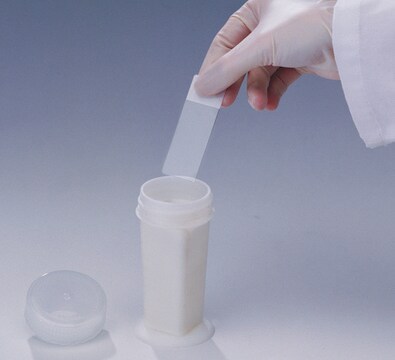OP80
Anti-APC (Ab-7) Mouse mAb (CC-1)
Synonym(s):
Anti-Adenomatus Polyposis Coli
About This Item
Recommended Products
biological source
mouse
Quality Level
clone
CC-1, monoclonal
form
liquid
contains
≤0.1% sodium azide
species reactivity
human, mouse, rat
manufacturer/tradename
Calbiochem®
storage condition
do not freeze
technique(s)
immunocytochemistry: suitable
immunofluorescence: suitable
immunohistochemistry (frozen sections): suitable
dilution
(Free-floating SectionsParaffin Sections)
isotype
IgG2b
shipped in
wet ice
storage temp.
2-8°C
General description
- Antibody Target Gene Symbol: APC
- Target Synonym: AI047805, Apc7, AU020952, AW124434, BTPS2, DP2, DP2.5, DP3, Familial adenomatous polyposis, FAP, GS, Min, RATAPC
- Entrez Gene Name: adenomatous polyposis coli
- Hu Entrez ID: 324 (Related Antibodies: ST1150, OP62, OP47L, OP44)
- Mu Entrez ID: 11789
- RatEntrez ID: 24205
Immunogen
Application
Well suited for IHC and IF studies of oligodendrocytes and optic nerves due to the antibody′s staining of the cell body as opposed to the myelinated processes. Both frozen sections and formalin-fixed, paraffin-embedded brain sections can be used. Antibody should be titrated for optimal results in individual systems.
Packaging
Warning
Physical form
Analysis Note
Positive control: Purkinje cells or cerebellum tissue
Legal Information
Storage Class Code
12 - Non Combustible Liquids
WGK
WGK 2
Flash Point(F)
Not applicable
Flash Point(C)
Not applicable
Certificates of Analysis (COA)
Search for Certificates of Analysis (COA) by entering the products Lot/Batch Number. Lot and Batch Numbers can be found on a product’s label following the words ‘Lot’ or ‘Batch’.
Already Own This Product?
Find documentation for the products that you have recently purchased in the Document Library.
Our team of scientists has experience in all areas of research including Life Science, Material Science, Chemical Synthesis, Chromatography, Analytical and many others.
Contact Technical Service








